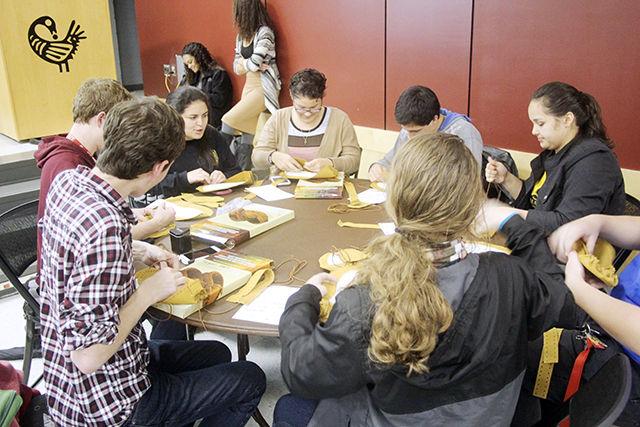 Students make moccasins at the Rock Your Mocs event at Witherspoon Hall Nov.9. This event was one of many Native American Heritage Month activities on campus. After building the moccasins, students are encouraged to wear them all week. The event was co-sponsored by Cisco." />
Students make moccasins at the Rock Your Mocs event at Witherspoon Hall Nov.9. This event was one of many Native American Heritage Month activities on campus. After building the moccasins, students are encouraged to wear them all week. The event was co-sponsored by Cisco." />
Chris Mervin
Students make moccasins at the Rock Your Mocs event at Witherspoon Hall Nov.9. This event was one of many Native American Heritage Month activities on campus. After building the moccasins, students are encouraged to wear them all week. The event was co-sponsored by Cisco.
Roughly 60 students gathered Monday night to sew, create and discuss moccasins as a part of a national campaign called “Rock Your Mocs” to highlight indigenous people and their traditional clothing.*
Multicultural Student Affairs hosted the event and provided 50 sets of moccasins and gave them all out before the event was halfway through. The event was a part of Native American Heritage month in partnership with Cisco.*
“The idea behind it is you will wear your moccasins for the entire week and you’ll take a picture, or not the entire week but just any day, and you’ll put that picture on social media and #RockYourMocs and that’s supposed to bring awareness to native people and indigenous issues,” said Brittany Hunt, assistant director of Multicultural Student Affairs and member of the Lumbee Tribe located in Robeson County.
Dakota Johnson, a sophomore studying engineering, explained that it was the lure of making his own moccasins that got him to the event.
“I saw ‘Rock Your Mocs’ and a chance to make moccasins and I’ve been wanting to make another pair,” Johnson said.*
With Halloween having recently ended and plenty of traditional Native American clothing appropriated, Emily Zucker, a senior studying mathematics and a member of Alpha Pi Omega, NC State’s Native American sorority, explained the differences between someone dressing up in a Native American headdress and someone wearing moccasins around campus in support of indigenous peoples.
“With a headdress, that has a really strong significance, spiritually,” Zucker said. “The feathers represent sort of a connection to the creator and only certain people will wear a headdress … Especially when women wear it—only chiefs wear headdresses, and only men are chiefs. You can’t just do that. You can’t just parade that around.”
According to Zucker her understanding of indigenous peoples comes from her participation with Alpha Pi Omega.
“Our whole mission is to create a support for college women in today’s society and it’s not exclusive to Native Americans,” Zucker said. “I’m not actually Native American but I like their views a lot and their sense of community, and it is wholeheartedly a sisterhood.
The sorority has four different clans that each represents one of their founding principles, Zucker explained. There’s the earth clan for education, the water clan for contemporary issues, the air clan for spirituality, and the fire clan for traditionalism. Each sister is sorted into a clan based on her personality and passions.
“We are meant to embody all four of those clans, but after you go through the process, the sisters choose for you which clan you’re initiated into,” Zucker said. “I’m the earth clan.”
In partnership with Native American Heritage Month, Alpha Pi Omega, will be hosting a Native Art Show in the MSA department Tuesday from 6-8 p.m. It is open for students to submit any form of art pieces, with two categories: one for Native American art and one for general student art.
**Editor’s Note: this article was edited on Nov. 10 to correct several errors: Attire worn by Native Americans is traditional clothing, not fashion. Multicultural Student Affairs hosted the event, not the Native American Student Association. All references to the Boy Scout’s of America’s organization Order of the Arrow have been removed because the group has no official connection to a Native American tribe or band, and has been the subject of concerns about cultural appropriation. The article also mistakenly stated that moccasins are not spiritual in nature, but the traditional footwear does have spiritual significance in some Native American communities.